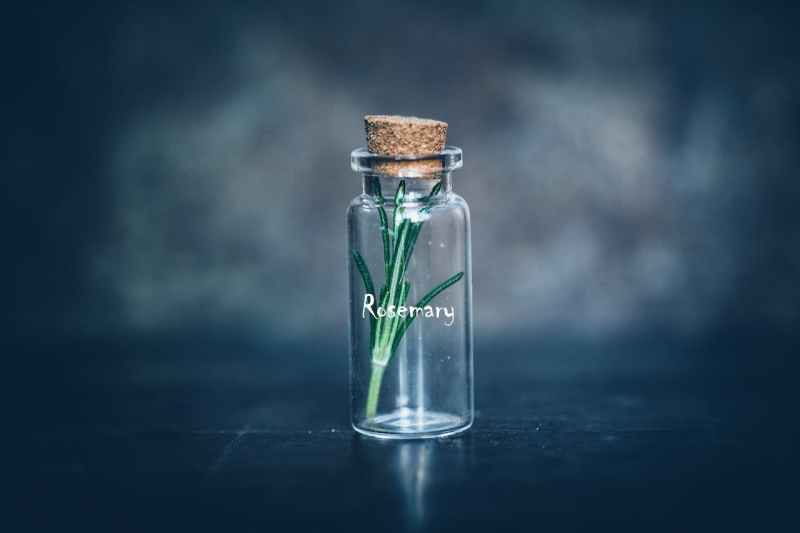
Hair loss can be a difficult, life-altering experience for the individuals who endure it. In many ways, our hair accounts for a major piece of our identities. It’s only natural to try combating hair loss by any means necessary. Numerous choices exist, spanning from self-care methods at home to surgical interventions, all aimed at restoring a full head of hair. But wait — don’t book a flight to Turkey for a hair transplant just yet! Rosemary oil may be the simple solution you’ve been searching for.
Amid the quest for natural hair restoration, rosemary oil emerges as a revered remedy, backed by fervent endorsements from countless individuals. Enter lifeaszeph, showcasing remarkable results through his ongoing journey to hair regrowth. At the heart of his transformation lies one important tool: rosemary oil. Yet, the question lingers — does this remedy truly deliver on its tantalizing promises?

What is the history of rosemary oil use?
The topical use of rosemary oil dates back centuries and has a rich historical background. Rosemary itself has been renowned since ancient times for its medicinal properties, and its oil was highly valued for various applications.
Historically, rosemary was revered by ancient cultures like the Greeks, Romans, and Egyptians, upheld as a symbol of remembrance, fidelity, and love. Commonly used in ancient skincare, healers turned to rosemary for its perceived ability to stimulate circulation, soothe muscle aches, and alleviate joint pains.
In more recent times, rosemary oil is still a popular ingredient for skincare, haircare, and aromatherapy. Studies continue to explore its potential benefits, especially in the realm of hair health and regrowth.

Does rosemary oil actually promote hair regrowth?
In short, yes. Scientific findings indicate that rosemary oil might even rival the effectiveness of the hair growth drug minoxidil. A 2015 research study demonstrated its ability to boost hair count in individuals with alopecia after a six-month period of use. This is only one of the many studies that point to rosemary’s effectiveness. Furthermore, there is a mountain of anecdotal evidence that points to this
How does it work?
While a variety of different factors may contribute to male pattern baldness, one major pathway involves DHT interacting with sensitive hair follicles, causing them to shrink. To tackle this, common medications like Finasteride aim to reduce DHT levels in the blood. They work by hindering 5α-reductase, an enzyme responsible for converting testosterone into DHT.
However, these pharmaceutical solutions can come with risky side effects, leading to a rising interest in more natural methods. Rosemary works in a very similar way to Finasteride, inhibiting the 5α-reductase enzyme. It also works to stimulate hair follicles with cytokines by stimulating more circulation to the scalp.

How to use rosemary oil for hair growth
To optimize your rosemary oil routine, gather a few essential items. First and foremost, get yourself some high-quality rosemary oil. There are oils specifically marketed as rosemary hair regrowth oil, but regular rosemary oil is just fine, too.
What you will also need:
- Carrier oil (i.e., coconut, jojoba, argan, castor oil)
- Mixing container or spray bottle
- Water
- Scalp massager (optional)
While any of the oils listed above are great options for carrier oil, castor oil offers an additional hair growth boost. This high-viscosity oil is also renowned for stimulating blood flow to the scalp. But if you do choose to incorporate this into your routine, limit it to one use per month.
Application process
Start by mixing together roughly 10 drops of rosemary oil with about 1 tablespoon of your chosen carrier oil. Be sure to do a spot test on your arm to make sure you don’t have an adverse reaction before applying it to the scalp. Once you’re confident that you’re not experiencing any irritation, you can apply the oil solution directly to your scalp.
If you want to start out with a more diluted solution, put your oil mixture in a spray bottle and fill it with water. Spray the solution onto your scalp.
Once you let the oil mixture or spray do its magic for 30 minutes to an hour, wash off your scalp. You can repeat this routine one to two times a week. Pay attention to how it affects your scalp’s oil production and make adjustments accordingly. If your scalp tends to be dry, you can probably manage two applications per week.
If you’re looking for some added scalp stimulation during your rosemary oil routine, use a scalp massager. These specialized tools not only feel amazing but also help promote even more blood flow to your hair follicles. Use it to massage the product into your skin during application.

Potential side effects of rosemary oil
Luckily, there aren’t many side effects to be concerned with when using rosemary oil on the scalp. As long as you use a carrier oil and limit your usage to twice a week tops, you should be in the clear. But if you do have sensitive skin or you don’t dilute the rosemary enough, you may experience redness, itching, and burning. If you do notice these side effects, discontinue use immediately.

When will you see results?
Effective hair loss solutions require patience for visible results. Improvements might begin in four to six weeks, while significant hair growth may take around three months. Consistently using rosemary oil aids in this process. Tracking progress through weekly pictures can motivate and ensure you stay on track with your routine.



